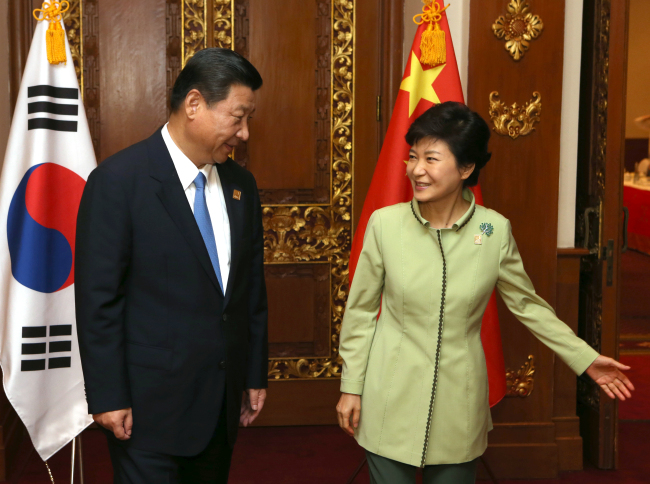- California Assembly OKs highest minimum wage in nation
- S. Korea unveils first graphic cigarette warnings
- US joins with South Korea, Japan in bid to deter North Korea
- LPGA golfer Chun In-gee finally back in action
- S. Korea won’t be top seed in final World Cup qualification round
- US men’s soccer misses 2nd straight Olympics
- US back on track in qualifying with 4-0 win over Guatemala
- High-intensity workout injuries spawn cottage industry
- CDC expands range of Zika mosquitoes into parts of Northeast
- Who knew? ‘The Walking Dead’ is helping families connect
S. Korea, China to begin discussions on Koreas’ unification

President Park Geun-hye meets Chinese President Xi Jinping on the sidelines of the Asia-Pacific Economic Cooperation summit in Bali, Indonesia, Monday. (Yonhap News)
SEOUL (Yonhap) — President Park Geun-hye on Friday said South Korea and China could quickly begin various discussions on how to achieve a peaceful unification between South and North Korea.
The move is the latest sign of deepening ties between Seoul and Beijing, given the sensitive nature of the issue.
North Korea is a traditional ally of China, which fought on North Korea’s side against South Korea and the U.S.-led U.N. forces in the 1950-53 Korean War.
North Korea’s ties with China have strained in recent years while South Korea and China have made great strides in their relations.
South Korea “would cooperate with China for a peaceful unification,” Park said in a press gaggle aboard Air Force One on the way back to Seoul from a trip to China. “Various discussions could begin as soon as possible on how to achieve a peaceful unification.” She did not provide a specific time frame.
Park has made pitches for unification in recent years, calling it a “bonanza” for South Korea as well as a blessing for neighboring countries.
Still, North Korea has long suspected that Seoul could be plotting to absorb Pyongyang, a claim denied by South Korea.
The rival Koreas remain technically in a state of war as the Korean War ended in an armistice, not a peace treaty.
Park believes that peaceful unification “is the fundamental and the quickest way to resolve” the standoff over North Korea’s nuclear weapons program.
Tensions persist on the divided peninsula over the North’s pursuit of its missile and nuclear weapons program. The communist country has a track record of staging provocations against South Korea.
The North — which conducted three nuclear tests — has repeatedly vowed to develop its economy and nuclear arsenal in tandem, viewing its nuclear programs as a powerful deterrent against what it claims is Washington’s hostile policy against it.
Park made the comments two days after she met with her Chinese counterpart, Xi Jinping, in Beijing and they warned North Korea against conducting a missile or nuclear test.
The warning came amid speculation that North Korea may stage a provocation in October to mark the 70th anniversary of the founding of its Workers’ Party.
“We can expect that there could be a nuclear test or other various provocations, Park said. “It is extremely important to deter them.”
Last year, North Korea threatened to conduct a “new form” of nuclear test.
North Korea has also vowed to continue to launch satellites for what it claims is science and economic development, calling it a sovereign right.
Still, South Korea and the United States view a satellite launch as a cover for testing the North’s ballistic missile technology, which is banned under a U.N. resolution.
Separately, Park said South Korea and China should make efforts to boost benefits of their free trade agreement.
South Korea and China signed a free trade agreement in June, though the deal has yet to be ratified by the respective legislatures of Seoul and Beijing.
She said the free trade deal would “bring a wide-range of opportunities and benefits” to both sides. She made the comment in a South Korea-China business forum in Shanghai before returning home late Friday.












![일본 사도광산 [서경덕 교수 제공. 재판매 및 DB 금지]](http://www.koreatimesus.com/wp-content/uploads/2024/07/PYH2024072610800050400_P4-copy-120x134.jpg)


